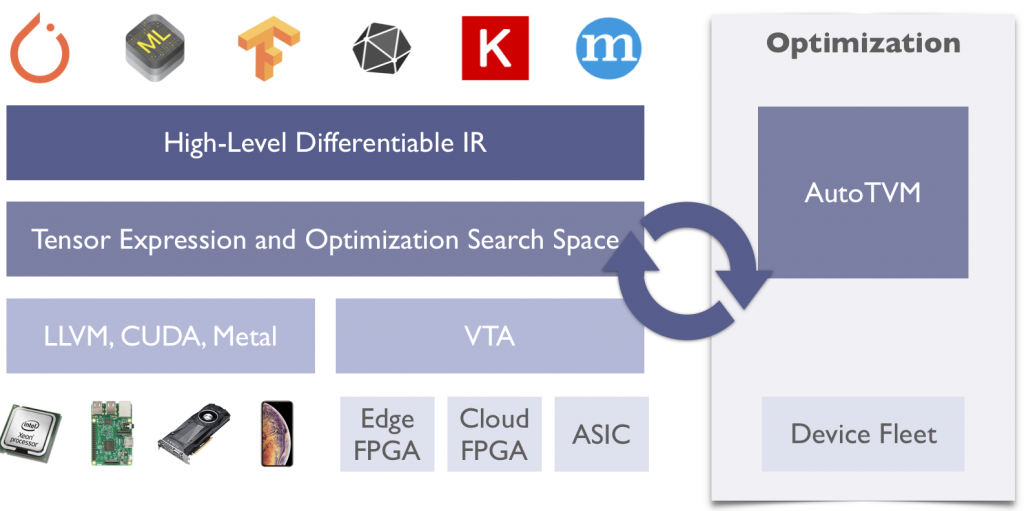The team behind the Allen School’s TVM framework, an end-to-end compiler stack which enables the rapid deployment of deep learning on a variety of platforms and devices, is marking a new milestone in the project’s development with its transition to the non-profit Apache Software Foundation.
The Apache open-source developer community focuses on incubating open-source software projects for the public good. By adding TVM to its incubator portfolio, Apache will ensure that the already popular framework will continue to evolve and expand to meet the needs of developers and hardware manufacturers.
“We are thrilled that TVM is entering an exciting new phase as an Apache incubator project,” said Allen School professor Luis Ceze. “Apache’s robust community of developers and proven track record of nurturing open-source innovation are the perfect environment in which to take TVM to the next level and expand its impact.”
TVM started out as a research project in the Allen School’s SAMPL group, an interdisciplinary team of researchers with expertise spanning machine learning, computer architecture, systems, programming languages, and software engineering. In addition to Ceze, members of the TVM research team include Allen School Ph.D. students Tianqi Chen, Meghan Cowan, Ziheng Jiang, Steven Lyubomirsky, Thierry Moreau, Jared Roesch, Haichen Shen, Luis Vega, and Eddie Yan; and professors Carlos Guestrin, Arvind Krishnamurthy and Zachary Tatlock. Together, they built a full-stack compiler that bridges the gap between deep-learning systems optimized for productivity, and the various programming, performance and efficiency constraints of the latest hardware. They followed up on the initial release of TVM with the Versatile Tensor Accelerator (VTA), an extension to TVM that enabled machine learning researchers and practitioners to explore hardware-software co-design techniques, and Relay IR, a high-level intermediate representation to effectively enable front-end workloads to be compiled and optimized. The SAMPL group organized the first developer conference last December which attracted 180 attendees from all around the world.
The TVM ecosystem quickly caught on within the developer community, which enjoyed the ability to quickly and easily deploy deep learning applications on a wide range of systems — from specialized chips and mobile phones, to wearables and embedded devices — without sacrificing battery power or speed. As an open-source project from the start, TVM has benefited from the input of nearly 200 individuals and organizations, including the likes of Amazon Web Services (AWS), Qualcomm, Facebook, Google, Huawei, AMD, Microsoft, Xilinx, Cornell University, University of California, Berkeley, and more. Several major technology companies have incorporated TVM’s functionality into the products and services they provide to end users.
“The values of the original TVM community and the Apache community are very much aligned,” noted Chen. “Both have demonstrated a commitment to advancing technological innovation within the context of an open, welcoming, and neutral policy towards technology development. It has been gratifying to work with the TVM community, and we look forward to continuing on the same path under the Apache umbrella.”
“The Apache incubation is a huge milestone for TVM,” said Moreau. “Developers will be able to benefit from, and contribute to the complete TVM stack: from the flexible high-level IR down to the design of VTA’s custom hardware architecture. This is truly a first in full-stack deep learning system optimization, and it’s going to open the path to exciting research.”
“Apache incubation will allow us to better collaborate with both researchers and industry,” said Roesch. “The TVM stack has continued to open new paths for collaboration, and enabled mutual technology transfer between companies and researchers. Industry quality software can help accelerate research, and research can open new product avenues for companies in a virtuous cycle. We can all benefit from sharing technology in an open stack equally accessible to all contributors.”
“TVM is right for the Apache Software Foundation, and the Apache Software Foundation is right for TVM: One thing the ASF excels at is enabling collaboration across organizations, and encouraging collaboration even among competitors. With contributions from such a wide range of organizations, TVM clearly fits that profile. I am honored to help the project thrive in the ASF,” said Markus Weimer, the ASF member who championed the incubation of TVM at the ASF.
Read the TVM announcement here, and visit the new Apache TVM incubator page here. Learn more about the Apache ecosystem here.


